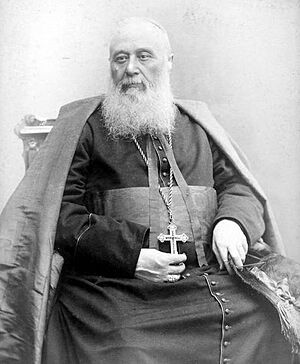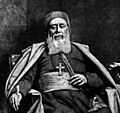Charles Lavigerie facts for kids
Quick facts for kids His Eminence Charles Martial Allemand Lavigerie M. Afr. |
|
|---|---|
| Cardinal Priest of Sant'Agnese fuori le mura | |
 |
|
| Enthroned | 3 July 1882 |
| Reign ended | 26 November 1892 |
| Predecessor | Pietro Gianelli |
| Successor | Georg von Kopp |
| Other posts |
|
| Orders | |
| Ordination | 2 June 1849 |
| Consecration | 22 March 1863 by Archbishop Marie-Dominique-Auguste Sibour |
| Personal details | |
| Born | 31 October 1825 Bayonne, France |
| Died | 26 November 1892 (aged 67) Algiers, French Algeria |
| Coat of arms |  |
Charles Martial Allemand Lavigerie (October 31, 1825 – November 26, 1892) was a French Catholic cardinal. He served as the Archbishop of Carthage and Archbishop of Algiers. He was also known as the Primate of Africa. He is famous for starting the White Fathers, a group of missionaries.
Lavigerie was a priest who became a bishop in France. He set up French Catholic missions and missionary groups to work in Africa. He wanted to share the Catholic faith with people in North Africa and further south. He also hoped to help them become French citizens.
He strongly fought against the slave trade. He created the White Fathers, an order of priests named for their white robes and red hats. He also started similar groups for brothers and nuns. His missionaries went to places like the Sahara, Sudan, Tunisia, and Tripolitania. Important leaders like the Pope and German Chancellor Otto von Bismarck supported his work.
Even though there were strong feelings against the church in France, a leader named Léon Gambetta supported Lavigerie. He said that anti-church ideas should not be "exported" to other countries. Lavigerie passed away in 1892 when he was 67 years old.
Contents
Early Life and Calling
Charles Lavigerie was born in Bayonne, France. He studied at St Sulpice in Paris. He became a priest in 1849. From 1854 to 1856, he taught church history at the Sorbonne university.
In 1856, he took charge of schools in the East. This was his first time working with people from the Islamic world. He wrote that this experience helped him find his true calling. In 1860, he traveled to Lebanon and Syria. He went there to help Christians during a difficult time.
His work helping people made him well-known. He received an award called the Legion of Honor. In October 1861, he became a French official in Rome.
Bishop in France and Africa
Two years later, in 1863, he became the Bishop of Nancy. He stayed there for four years. During this time, his diocese became one of the best managed in France. He was offered the job of Archbishop of Lyons but turned it down. Instead, he asked to be appointed to the see of Algiers, which had just become an archbishopric.
Lavigerie arrived in Africa on May 11, 1868. A big famine was happening at that time. In November, he started gathering orphans into villages to help them.
However, the governor of Algeria, Marshal MacMahon, did not approve. He worried that local people would see it as a religious interference. He believed the Muslim faith, being official in Algeria, should be protected. So, Lavigerie was told his only job was to serve the French colonists. But Lavigerie made it clear he had come to help everyone in Algeria.
Founding the White Fathers
Helping the local people during the famine made Lavigerie believe many would convert to Catholicism. He was so enthusiastic that he offered to give up his archbishop job to focus only on missions. Pope Pius IX said no to this. But the Pope did give him an assistant and put all of equatorial Africa under his care. In 1870, at the First Vatican Council, Lavigerie strongly supported the idea of papal infallibility.
In 1868, he founded the Société des missionnaires d'Afrique. This group is commonly known as the Pères Blancs or White Fathers. They were named for the white robes they wore, similar to North African clothing. Lavigerie himself wrote the rules for the order.
In 1874, he started the Sahara and Sudan mission. He sent missionaries to Tunis, Tripoli, East Africa, and the Congo.
Fighting Slavery and Later Years
From 1881 to 1884, his work in Tunisia greatly increased France's influence. This led Léon Gambetta to famously declare, "Anticlericalism is not an article for export." This meant that anti-church ideas should not be spread to other countries.
On March 27, 1882, Lavigerie was made a cardinal. He was given the church of Sant'Agnese fuori le mura. His big goal was to bring back the important church seat of St Cyprian. He succeeded, and on November 10, 1884, the main church of Carthage was re-established. Lavigerie received a special cloth called the pallium on January 25, 1885.
In his later years, he passionately spoke out against the slave trade. His powerful speeches moved many people in London, Paris, Brussels, and other European cities. He helped Adrien Atiman, a medical student who had been freed from slavery by the White Fathers, to study at the University of Malta.
In 1890, Lavigerie became involved in politics. He worked with Pope Leo XIII to try and bring the church and the French republic closer together. He invited naval officers to lunch in Algiers. He showed his support for the republic and even had his White Fathers band play the Marseillaise, the French national anthem. Lavigerie's health began to fail, and he passed away in Algiers on November 26, 1892.
See also
- White Fathers
- Catholic youth sports associations of French Algeria
- Listing of the works of Alexandre Falguière
Images for kids
-
Alexandre Falguière, Monument dedicated to the cardinal Lavigerie in Bayonne (détail).
 | Janet Taylor Pickett |
 | Synthia Saint James |
 | Howardena Pindell |
 | Faith Ringgold |




